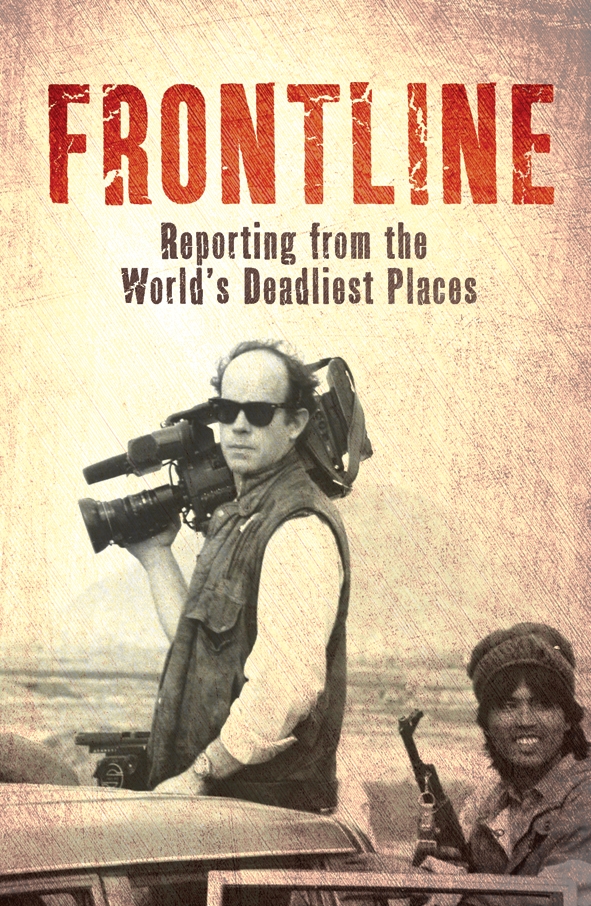Frontline: a high peak of journalism
Today we are pleased to post the first of two excerpts from the newly revised and updated edition of Frontline by David Loyn, published last month by Summersdale.
The acclaimed book tells the gripping story of the Frontline news agency, founded by journalists Rory Peck, Peter Jouvenal, Vaughan Smith and Nicholas Della Casa.
The first of the excerpts, BBC world affairs editor John Simpson’s foreword, can be read below.
*****
Foreword by John Simpson
This book is the history of a moment in television news, which was brief enough, yet so bright that it will stay in the minds of everyone who experienced it, like staring into a torch-beam on a dark night.
Frontline still exists, as anyone knows if they have climbed up the steep stairs to the club-room above the Frontline restaurant in Paddington. Men and women recently back from somewhere terrifying and unpronounceable lounge around in the leather armchairs, or prop up the bar. Objets trouvés, bits of wrecked cameras, looted street signs and something which turns out to be Mo Amin’s prosthetic arm gleam out from glass cases around the walls. Only Frontline, you feel, would put the false arm of a now-dead cameraman on display.
 But time has passed, the world has changed, and those who choose to document its weirder and more dangerous aspects have to adapt to new ways of doing things. Television news is different from the way it was in the 1980s and 1990s, and wars – Frontline’s greatest stock-in-trade – are different too. They have become even more dangerous for the adventurous freelance cameraman or camerawoman to cover, and the old sense of protection which you used to get from owning a press-card and sticking the initials ‘TV’ in gaffer-tape on the windscreen of your car has long since evaporated. Cameramen no longer have the fl imsy security of being regarded as neutral onlookers. Nowadays they, and the reporters who work with them, are treated as though they have taken sides. Wars have become primarily a matter for propaganda, for spin, for twisting the facts.
But time has passed, the world has changed, and those who choose to document its weirder and more dangerous aspects have to adapt to new ways of doing things. Television news is different from the way it was in the 1980s and 1990s, and wars – Frontline’s greatest stock-in-trade – are different too. They have become even more dangerous for the adventurous freelance cameraman or camerawoman to cover, and the old sense of protection which you used to get from owning a press-card and sticking the initials ‘TV’ in gaffer-tape on the windscreen of your car has long since evaporated. Cameramen no longer have the fl imsy security of being regarded as neutral onlookers. Nowadays they, and the reporters who work with them, are treated as though they have taken sides. Wars have become primarily a matter for propaganda, for spin, for twisting the facts.
The glory days of Frontline, the days which David Loyn has chronicled so well and so affectionately in this book, now have a feeling almost of innocence about them: or, if innocence isn’t exactly the word that springs to mind when you think of people like Peter Jouvenal, Rory Peck and Vaughan Smith, then there is unquestionably a feeling of straight-dealing, of honourable behaviour, of a long tradition of decent reporting. The American journalist Martha Gellhorn, who died in 1998 a few days short of her 90th birthday, used to love it when I told her stories about Frontline, and she said to me, ‘They sound just like the kind of people I used to work with in the War.’ It was an accolade to be relished; Martha, who worked alongside Capa and Ernie Pyle, and shamed her husband Ernest Hemingway into leaving his fishing in Cuba to come to Europe in time for D-Day, approved greatly of people like Peter and Vaughan and Rory: real journalists, she called them.
The group they formed in Peshawar during the Soviet occupation of Afghanistan had real glamour. They might be adventurers, but they were gentlemen and you could trust them. If a Frontline cameraman promised to go with you, he would stay with you whatever happened. If a Frontline cameraman sold you video, it would be precisely what he said it was. There was nothing questionable, nothing dodgy, about Frontline footage. The provenance alone was a suffi cient guarantee of quality: and this in an area where so many spooks and crooks and weirdos were operating. If you were good enough for Frontline to take you on, then you could be trusted.
Some of the best times of my professional life were spent working with people like Rory, Vaughan and Peter, and I suspect the same is true for David Loyn. To read about their lives and careers in this excellent, well-researched book is a considerable pleasure; and I am proud to be a bit-part player on one or two of the pages that follow. My guess is that, partly thanks to the fact that David has written the definitive account of them and of all the other brave and charming people who worked for the organization over the years, Frontline will be remembered as one of the high peaks of journalism. Martha Gellhorn certainly thought so, and she was a pretty good judge.
*****
Frontline: Reporting from the World’s Deadliest Places can be purchased by visiting this link.
Reproduced by kind permission of David Loyn and Summersdale Publishers.
